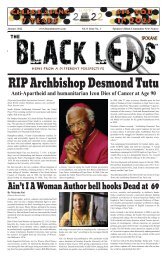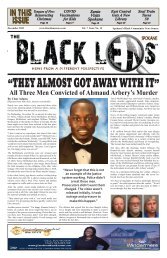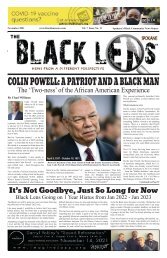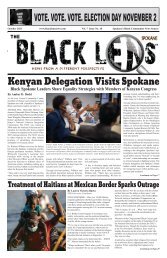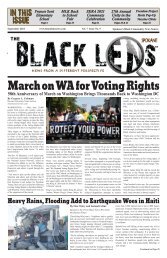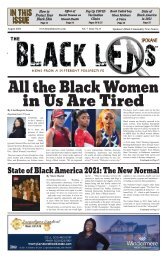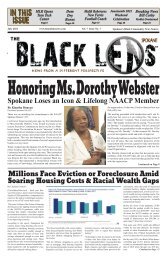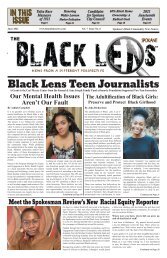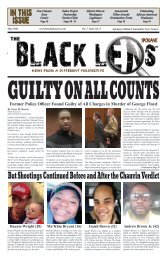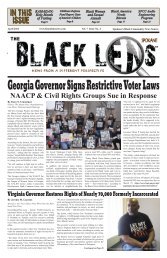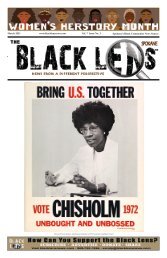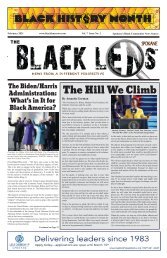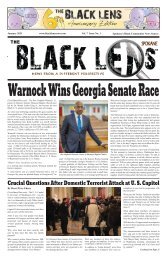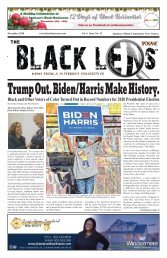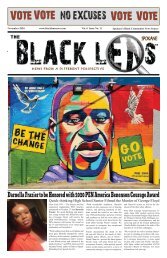September 2017
The Black Lens is a local community newspaper based in Spokane, WA, that focuses on the news, issues, events and people of importance to the African American community.
The Black Lens is a local community newspaper based in Spokane, WA, that focuses on the news, issues, events and people of importance to the African American community.
Create successful ePaper yourself
Turn your PDF publications into a flip-book with our unique Google optimized e-Paper software.
Page 10<br />
<strong>September</strong> <strong>2017</strong><br />
www.blacklensnews.com<br />
The Black Lens Spokane<br />
Health & medicine<br />
DR. STEFAN HUMPHRIES:<br />
Making Our Churches Healthy<br />
Dr. Stefan Humphries has been working with a planning group<br />
in Spokane spearheaded by Pastor Happy Watkins of New Hope<br />
Baptist Church and Elder Ezra Kinlow of Holy Temple Church of<br />
God in Christ, who have been meeting weekly with the Spokane<br />
Regional Health District to organize a community health event<br />
that will address the key health issues that are disproportionately<br />
affecting the African American community. The Black Lens had<br />
the opportunity to interview Dr. Humphries about his work and<br />
his background. The following is an excerpt from that interview:<br />
Tell me about your background. You were an athlete and<br />
then became a doctor, is that correct?<br />
Yes, that’s correct. I had an opportunity that was afforded<br />
to me to play professional football. I had a great experience<br />
with the Bears and the Broncos, and I got to play in<br />
a couple of Super Bowls. But most professional athletes<br />
will tell you, they are only as good as their last injury and I<br />
had a fairly significant injury that took me out of the game.<br />
I had always thought that I would become a doctor at some<br />
point in my life and most of us who go though high school<br />
playing high school athletics and then go on to play collegiate<br />
athletics know that very few have the opportunity<br />
to play professional athletics. So, as I matriculated at the<br />
University of Michigan, my goal was to eventually go to<br />
medical school or to do something medical related. I majored<br />
in bio-engineering, with the idea that I would either<br />
go into clinical medicine or go into some kind of research<br />
in a medically related field.<br />
As it turned out, after my career was cut short with an injury,<br />
I had the opportunity to fulfill that dream of going to<br />
medical school. I did that at the University of Colorado<br />
and subsequently did a residency at the Mayo Clinic in<br />
physical medicine and rehabilitation.<br />
What made you want to be a doctor?<br />
I had a sister that became a doctor and she and I are kindred<br />
spirits. She was older and kind of my mentor in a lot<br />
of ways. And as I grew up, I used to love Marcus Welby<br />
M.D. I said to myself, I’m going to be Marcus Welby M.D.<br />
one day. It was also a combination of having great parents,<br />
I thank the Lord to this day that he blessed me with great<br />
parents, and having great role models in my life. I think it<br />
kept me grounded. It kept me moving in the right direction.<br />
African Americans are over-represented in most health<br />
categories, why do we as a people seem to be less<br />
healthy?<br />
I’ve thought about that myself. I look at my own family<br />
and some of the conditions that my aunts and uncles, my<br />
mother and father have and they certainly are the same<br />
things that always come up. Diabetes. Hypertension.<br />
Stroke. So, I think it begs the question of whether or not<br />
we have been exposed in a meaningful way to managing<br />
our health. I think it is needed in our communities, education<br />
about prevention and health management. As well as<br />
education about healthy lifestyles and healthy behaviors.<br />
Certainly, it’s not limited to the Black community. You can<br />
look across the board and healthy behaviors and prevention<br />
is needed across all populations, but I hear what you<br />
are saying and I definitely do see some recurrent themes<br />
that pertain to Black health and those include hypertension<br />
management and diabetes management.<br />
How did you get involved in doing this type of work?<br />
I first came to Spokane when I was recruited to work for<br />
St. Lukes Rehabilitation Institute and through my affiliation<br />
with St. Lukes, I had the opportunity to meet Pastor<br />
Happy Watkins and Rev. Kinlow. We’ve talked about how<br />
to better the experience for the Black community in Spokane<br />
over the years. As it so happens, I joined Work Well<br />
Consultants in 2008 and our goal was to raise awareness<br />
about health wellness in the employer community. Pastor<br />
Watkins and I continued to talk about an event for the<br />
church that would raise the awareness of wellness and that<br />
event is finally coming to fruition as we’ve gotten more<br />
people involved.<br />
Rev. Watkins and Rev. Kinlow will be hosting an event for<br />
the church community in October that stresses health and<br />
wellness, including becoming aware of your numbers, so<br />
that the community can use that information to better their<br />
own health and wellness.<br />
If a person were to come to the health event, what is the<br />
key thing that you want them to get out of it?<br />
I think our goal is to empower individuals to be actors in<br />
their own health and wellness. That includes not only going<br />
to a provider on a yearly basis, but actually engaging in<br />
healthy activities and a healthy diet. In that way, hopefully,<br />
preventing the development of some of the conditions that<br />
might otherwise lead to something catastrophic. For those<br />
who already have conditions, the goal is to engage them<br />
in a way that they are active in the management of those<br />
conditions.<br />
A lot of us walk around and we think we’re fine, but in<br />
all actuality, we have uncontrolled hypertension. We have<br />
the onset of diabetes. We’re kind of a walking time bomb.<br />
So, at the event, in addition to biometric screenings, there<br />
will be individuals talking about how to maintain your<br />
health and wellness, and for those who have issues with<br />
hypertension, diabetes, other medial conditions, they will<br />
be able to have information provided to them about continued<br />
management, as well as information about access to<br />
health care providers in the community that might be able<br />
to help them manage those conditions.<br />
Do you have any advice for young African Americans?<br />
For me, it started in my home. I had a mom and dad who<br />
were both educators, and stressed the importance of education,<br />
so my encouragement to young African Americans<br />
is to take their education seriously. I can’t stress enough<br />
the importance of taking your education seriously, because<br />
it sets you up for success or failure, depending on how<br />
seriously you take it. Education is the key to success in<br />
America.<br />
A lot of us, don’t necessarily think about goals early on<br />
as we’re going to high school. Having some career goals,<br />
I think is very important, so that it gives you some direction.<br />
Without those career goals sometimes the direction<br />
is not necessarily clear and you begin to spin your wheels<br />
and you can go off course. I think you need to look for<br />
mentors. Mentors that have been successful and that are<br />
willing to help you find success as well.<br />
It’s kind of a vision quest. Having that vision. Having that<br />
direction lends itself to defining what work ethic needs to<br />
occur to meet the goals. And also don’t be afraid of having<br />
big goals. Most of us don’t have stretch goals. I’m encouraging<br />
our up and coming scientists, doctors and lawyers<br />
to have stretch goals. To challenge themselves, because in<br />
that challenge somewhere is their greatness.<br />
The Make Our Churches Healthy Community event is<br />
coming in October. Stay tuned for more information.



